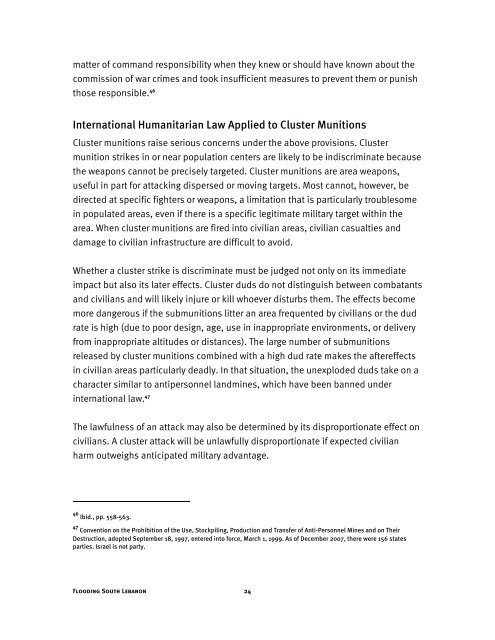Flooding South Lebanon - Human Rights Watch
Flooding South Lebanon - Human Rights Watch
Flooding South Lebanon - Human Rights Watch
Create successful ePaper yourself
Turn your PDF publications into a flip-book with our unique Google optimized e-Paper software.
matter of command responsibility when they knew or should have known about the<br />
commission of war crimes and took insufficient measures to prevent them or punish<br />
those responsible. 46<br />
International <strong>Human</strong>itarian Law Applied to Cluster Munitions<br />
Cluster munitions raise serious concerns under the above provisions. Cluster<br />
munition strikes in or near population centers are likely to be indiscriminate because<br />
the weapons cannot be precisely targeted. Cluster munitions are area weapons,<br />
useful in part for attacking dispersed or moving targets. Most cannot, however, be<br />
directed at specific fighters or weapons, a limitation that is particularly troublesome<br />
in populated areas, even if there is a specific legitimate military target within the<br />
area. When cluster munitions are fired into civilian areas, civilian casualties and<br />
damage to civilian infrastructure are difficult to avoid.<br />
Whether a cluster strike is discriminate must be judged not only on its immediate<br />
impact but also its later effects. Cluster duds do not distinguish between combatants<br />
and civilians and will likely injure or kill whoever disturbs them. The effects become<br />
more dangerous if the submunitions litter an area frequented by civilians or the dud<br />
rate is high (due to poor design, age, use in inappropriate environments, or delivery<br />
from inappropriate altitudes or distances). The large number of submunitions<br />
released by cluster munitions combined with a high dud rate makes the aftereffects<br />
in civilian areas particularly deadly. In that situation, the unexploded duds take on a<br />
character similar to antipersonnel landmines, which have been banned under<br />
international law. 47<br />
The lawfulness of an attack may also be determined by its disproportionate effect on<br />
civilians. A cluster attack will be unlawfully disproportionate if expected civilian<br />
harm outweighs anticipated military advantage.<br />
46 Ibid., pp. 558-563.<br />
47 Convention on the Prohibition of the Use, Stockpiling, Production and Transfer of Anti-Personnel Mines and on Their<br />
Destruction, adopted September 18, 1997, entered into force, March 1, 1999. As of December 2007, there were 156 states<br />
parties. Israel is not party.<br />
<strong>Flooding</strong> <strong>South</strong> <strong>Lebanon</strong> 24
















